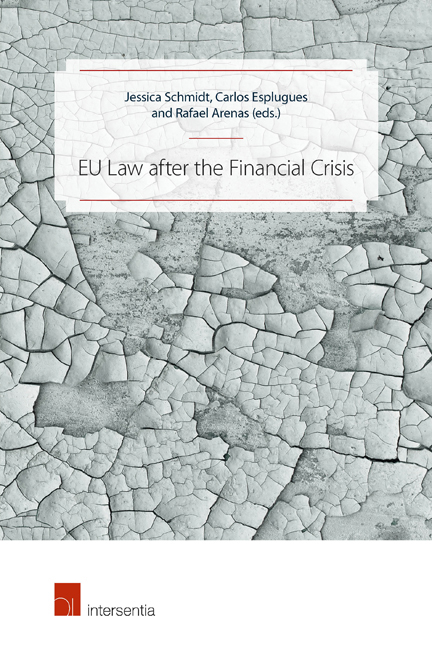Book contents
- Frontmatter
- Contents
- List of Abbreviations
- List of Authors
- Introduction
- PART I RESCUE MECHANISMS AND MONETARY POLICY
- PART II THE IMPACT OF THE FINANCIAL CRISIS ON THE BANKING SECTOR AND CAPITAL MARKETS
- PART III THE FINANCIAL CRISIS AND TAX LAW
- PART IV THE FINANCIAL CRISIS, CONSUMERS AND CONSUMER LAW
- Is European Private Law Going Through a Crisis? The Current Situation of European Private Law after the Financial Crisis
- Financial Crisis and General Contract Law
- Stress-Testing EU Law in the Field of Consumer Redress
- Stress Testing of European Law of Consumer Jurisdiction. Coherence of the Existing Rules and their Impact on the Level of Consumer Protection
- PART V THE FINANCIAL CRISIS AND COMPETITION LAW
- PART VI THE FINANCIAL CRISIS, RESTRUCTURING AND INSOLVENCY LAW
- PART VII THE SOCIAL DIMENSION OF THE FINANCIAL CRISIS AND EU CITIZENSHIP
- PART VIII REFLECTIONS ON THE IMPACT OF THE FINANCIAL CRISIS ON THE GENERAL EUROPEAN LEGAL FRAMEWORK AND THE FUNDAMENTAL “EUROPEAN IDEA”
Is European Private Law Going Through a Crisis? The Current Situation of European Private Law after the Financial Crisis
from PART IV - THE FINANCIAL CRISIS, CONSUMERS AND CONSUMER LAW
Published online by Cambridge University Press: 13 December 2017
- Frontmatter
- Contents
- List of Abbreviations
- List of Authors
- Introduction
- PART I RESCUE MECHANISMS AND MONETARY POLICY
- PART II THE IMPACT OF THE FINANCIAL CRISIS ON THE BANKING SECTOR AND CAPITAL MARKETS
- PART III THE FINANCIAL CRISIS AND TAX LAW
- PART IV THE FINANCIAL CRISIS, CONSUMERS AND CONSUMER LAW
- Is European Private Law Going Through a Crisis? The Current Situation of European Private Law after the Financial Crisis
- Financial Crisis and General Contract Law
- Stress-Testing EU Law in the Field of Consumer Redress
- Stress Testing of European Law of Consumer Jurisdiction. Coherence of the Existing Rules and their Impact on the Level of Consumer Protection
- PART V THE FINANCIAL CRISIS AND COMPETITION LAW
- PART VI THE FINANCIAL CRISIS, RESTRUCTURING AND INSOLVENCY LAW
- PART VII THE SOCIAL DIMENSION OF THE FINANCIAL CRISIS AND EU CITIZENSHIP
- PART VIII REFLECTIONS ON THE IMPACT OF THE FINANCIAL CRISIS ON THE GENERAL EUROPEAN LEGAL FRAMEWORK AND THE FUNDAMENTAL “EUROPEAN IDEA”
Summary
INTRODUCTION
The present volume brings together a number of contributions originating from a conference on “Testing the stress of the EU – EU law after the financial crisis”’. They do so by looking at the general theme from different angles, by focusing on different areas of law, and by asking different questions: What impact does the financial crisis have on EU law? How are the manifold problems resulting from the financial crisis addressed by the EU and by EU law? And which legal problems – even though they might have already been known before the crisis – have come to the centre of our attention? Thus, the contributions of the present volume do not simply address fiscal or monetary problems from legal perspectives. They go beyond that: insolvency law, merger control, consumer law, tax law, free movement of persons, and patent law are just some of the many areas of law which the contributions touch upon. I will add yet another perspective: what – direct or indirect – impact does the financial crisis have on private law and, more specifically, on European private law?
As a starting point I would like to pick up a distinction which Paloma García Picazo draws in her contribution, although I will interpret this distinction slightly differently than she does. She asks whether one should talk of the crisis of Europe or merely of a crisis in Europe. Indeed, the general theme of the present volume is “EU law after the financial crisis”. The idea of Europe and the EU cannot be reduced to fiscal or monetary matters. Both the idea of Europe and the EU go beyond fiscal and monetary questions. With this starting point one may argue that the financial crisis has initially been simply a crisis in Europe. Of course, a crisis in Europe which is at first confined to a very specific area can have the potential to develop into the crisis of Europe as a whole – extending to every facet of it. However, that is the very question I wish to address in my contribution with a view to European private law. Has the financial crisis had an impact on European private law? Or even more dramatically, is there a crisis of European private law today?
- Type
- Chapter
- Information
- EU Law after the Financial Crisis , pp. 109 - 116Publisher: IntersentiaPrint publication year: 2016

